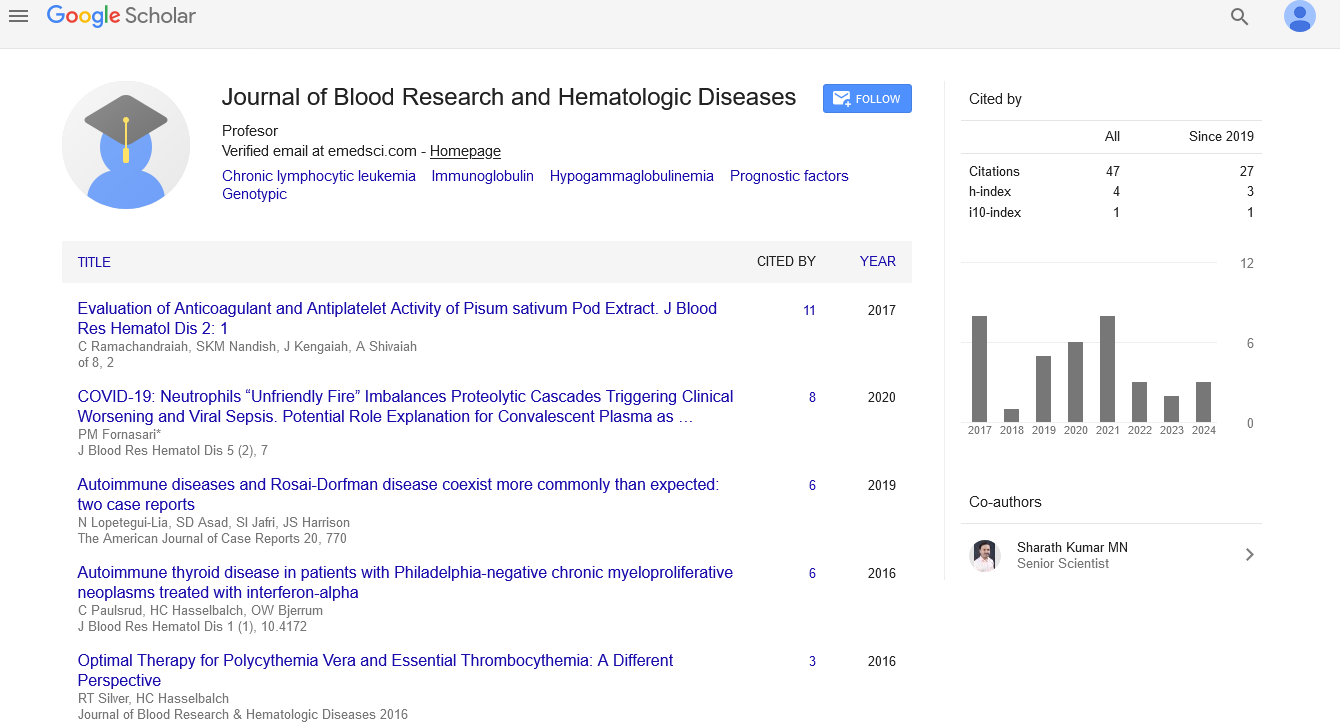Commentary, J Blood Res Hematol Dis Vol: 8 Issue: 2
Innovations and Challenges in Blood Banking and Transfusion Medicine
Nour Shmookler*
1Department of Pathology, St. Louis University, St. Louis, United States of America
*Corresponding Author: Nour Shmookler,
Department of Pathology, St.
Louis University, St. Louis, United States of America
E-mail: nshmookler@stlu.edu
Received date: 29 May, 2023, Manuscript No. JBRHD-23-106777;
Editor assigned date: 31 May, 2023, PreQC No. JBRHD-23-106777 (PQ);
Reviewed date: 14 June, 2023, QC No. JBRHD-23-106777;
Revised date: 21 June, 2023, Manuscript No. JBRHD-23-106777 (R);
Published date: 28 June, 2023, DOI: 10.4172/jbrhd.1000167
Citation: Shmookler N (2023) Innovations and Challenges in Blood Banking and Transfusion Medicine. J Blood Res Hematol Dis 8:2.
Description
Blood banking and transfusion medicine are vital components of modern healthcare systems, ensuring the availability of safe and compatible blood products for patients in need. Over the years, significant innovations have revolutionized these fields, enhancing transfusion safety, optimizing donor screening, and improving patient outcomes. However, with these advancements come unique challenges that require careful consideration and ongoing studies.
Advancements in blood banking
The field of blood banking has witnessed remarkable innovations aimed at improving blood collection, storage, and testing procedures. One such innovation is the development of blood component therapy, which allows for the separation of whole blood into specific components such as red blood cells, platelets, and plasma. This practice ensures that patients receive only the necessary blood constituents, minimizing the risks associated with unnecessary transfusions and maximizing the utility of donated blood.
Another significant advancement is the introduction of Nucleic Acid Testing (NAT) to screen donated blood for infectious agents. NAT has significantly enhanced blood safety by detecting the presence of viral DNA or RNA, reducing the window period during which infections may go undetected. This innovation has played a vital role in preventing the transmission of diseases such as HIV, hepatitis B and C, and West Nile virus through transfusions.
In addition to safety improvements, advancements in blood banking have focused on enhancing the availability of compatible blood products. Molecular typing techniques, such as Polymerase Chain Reaction (PCR) and DNA sequencing, have facilitated more precise blood typing, including the identification of rare blood types and extended blood group systems. These innovations have been instrumental in providing a broader range of compatible blood products, especially for patients with complex transfusion requirements.
Challenges in blood banking and transfusion medicine
Despite significant progress, several challenges persist in the field of blood banking and transfusion medicine. Demand fluctuates, and maintaining sufficient inventory, particularly for rare blood types, can be challenging. Efforts are underway to encourage regular blood donations and develop innovative recruitment strategies to meet the demand consistently.
Another challenge lies in ensuring the quality and safety of donated blood. Despite rigorous screening procedures, there is still a risk of transfusion-transmissible infections. Emerging pathogens and new variants pose ongoing challenges in maintaining a comprehensive screening process. Continuous studies and surveillance are important to stay ahead of these evolving threats.
Transfusion-related adverse reactions present another challenge. While transfusions are generally safe, complications such as allergic reactions, Transfusion-Related Acute Lung Injury (TRALI), and hemolytic reactions can occur. Identifying risk factors and developing improved methods to detect and prevent these reactions are ongoing areas of investigation.
An additional challenge involves providing optimal blood product management. The appropriate use of blood components, minimizing unnecessary transfusions, and promoting evidence-based transfusion practices are essential for improving patient outcomes. Education and collaboration among healthcare professionals are essential to address this challenge effectively.
Innovations and future directions
To overcome these challenges, ongoing studies is focused on several areas. One key area is the development of alternative blood products and transfusion substitutes, such as artificial blood substitutes and oxygen carriers, which could provide alternatives in emergency situations or for patients with specific medical conditions.
Advancements in laboratory techniques, such as pathogen inactivation methods, are being explored to further enhance blood safety. These techniques aim to inactivate or remove pathogens while preserving the therapeutic properties of blood components.
Moreover, technological advancements, including automation and robotics, are being implemented to streamline processes in blood banking and transfusion medicine. These innovations help improve efficiency, reduce human error, and ensure accurate tracking and traceability of blood products.
Conclusion
Innovations in blood banking and transfusion medicine have greatly transformed the field, enhancing transfusion safety, improving inventory management, and expanding the range of compatible blood products. However, challenges such as maintaining an adequate blood supply, ensuring safety, and optimizing transfusion practices persist. Through ongoing studies, collaboration, and technological advancements, the field continues to evolve, aiming to address these challenges and further improve patient outcomes. By fostering innovation and staying proactive, the future of blood banking and transfusion medicine holds the promise of even greater advancements, ultimately benefiting patients in need.
 Spanish
Spanish  Chinese
Chinese  Russian
Russian  German
German  French
French  Japanese
Japanese  Portuguese
Portuguese  Hindi
Hindi 